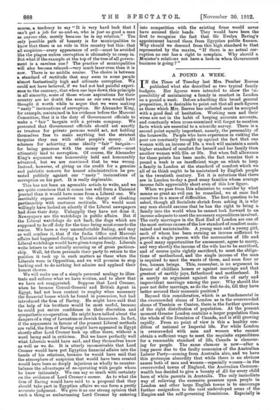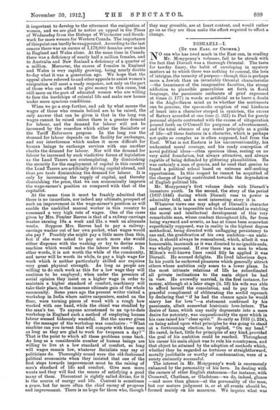A POUND A WEEK.
IN the Times of Tuesday last Mrs. Pember Reeves published what she described as two typical family budgets. Her figures were intended to show the im- possibility of maintaining a family in comfort in London on a pound a week. Before admitting this broad general proposition, it is desirable to point out that all such figures as those which Mrs. Reeves has collected must be accepted with a good deal of hesitation. Working men and their wives are not in the habit of keeping accurate accounts, and constantly when cross-examined will forget to mention facts which are essential to a scientific survey. There is a second point equally important, namely, the personality of the housewife. People who have experience in visiting the poor are constantly brought up against the fact that one woman with an income of 18s. a week will maintain a much higher standard of comfort for herself and her family than another woman with 25s. or 30s. But when full allowance for these points has been made, the fact remains that a pound a week is an insufficient wage on which to keep a family in London at the standard of comfort which we all of us think ought to be maintained by English people in the twentieth century. Yet it is notorious that there are in London to-day a good many families whose average income falls appreciably short even of this low figure.
When we pass from this admission to consider by what means so great an evil can be remedied, we at once find ourselves in a maze of difficulties. The first question to be asked, though all Socialists shrink from asking it, is why any man should assume that he has the right to bring a family into the world when he cannot look forward to an income adequate to meet the necessary expenditure involved. The early marriages in the East End of London are one of the most serious causes of the low standard of comfort main- tained and maintainable. A young man and a young girl, each of whom has been earning an income sufficient to provide a single person with the necessaries of life and a good many opportunities for amusement, agree to marry, and very shortly the income of the wife has to be sacrificed, and of course quite rightly sacrificed, to meet the obliga- tions of motherhood, and the single income of the man is required to meet the wants of three, and soon four or five, human beings. This, remember, is no argument in favour of childless homes or against marriage and that greatest of earthly joys, fatherhood and motherhood. It is merely an argument against the evils of early and improvident marriage among the poor. Why should the poor not defer marriage, as do the well-to-do, till they have better secured their economic position? Beyond this consideration, which is as fundamental in the overcrowded slums of London as in the overcrowded slums of Tientsin or Canton, there is the further question of the right distribution of population. At the present moment Greater London contains a larger population than the whole of the Dominion of Canada, and is still growing rapidly. From no point of view is this a healthy con- dition of national or Imperial life. For while London is overcrowded with men and women who cannot obtain a sufficient wage to meet the requisite expenditure for a reasonable standard of life, Canada is clamour- ing for people. The same clamour is now—after a long pause due to the faulty economics of the Australian Labour Party—coming from Australia also, and we have this grotesque absurdity that while there is an obvious excess both of men and women—especially women—in the overcrowded towns of England, the Australian Common- wealth has decided to give a bounty of .t5 for every child born of white parents in Australia. The only immediate way of relieving the excessive pressure upon people in London and other large English towns is to encourage further emigration to the vast undeveloped areas of the Empire and the self-governing Dominions. Especially is it important to develop to the uttermost the emigration of women, and we are glad to notice an appeal in the Times of Wednesday from the Bishops of Winchester and South- wark for more women for Western Canada. The importance of this point can hardly be exaggerated. According to the last census there was an excess of 1,178,000 females over males in England and Wales alone. At the same time in Canada there was a deficiency of nearly half a million females, and in Australia and New Zealand a deficiency of a quarter of a million. Moreover, the excess of females in England and Wales is very rapidly growing, being nearly double to-day what it was a generation ago. We hope that the appeal above referred to and other appeals to assist women's emigration will meet a ready response, not only on the part of those who can afford to give money to this cause, but still more on the part of educated women who are willing to face the hardships of colonial life and make new homes under more spacious conditions.
When we go a step further, and ask by what means the wages of those who remain behind are to be raised, the only answer that can be given is that in the long run wages cannot be raised unless there is a greater demand for labour, and the demand for labour will not be increased by the remedies which either the Socialists or the Tariff Reformers propose. In the long run the demand for labour depends on the facility for exchanges, and any interference which makes it more difficult for human beings to exchange services with one another checks the demand for labour. Nor will the demand for labour be increased by such vindictive forms of legislation as the Land Taxers are contemplating. By diminishing the security for the employment of capital in this country the Land Taxers are artificially driving capital abroad, and thus pro tank) diminishing the demand for labour. It is only by increasing the supply of capital, and thereby diminishing the price, that we can economically improve the wage-earner's position as compared with that of the capitalist. At the same time it must be frankly admitted that there is no immediate, nor indeed any ultimate, prospect of such an improvement in the wage-earner's position as will enable the unskilled manual worker in this country to command a very high rate of wages. One of the cases given by Mrs. Pember Reeves is that of a railway-carriage washer earning 18s. a week and 21s. a week on alternate weeks. Suppose Mrs. Reeves had to pay a railway- carriage washer out of her own pocket, what wages would she pay ? Possibly she might pay a little more than this, but if she were asked to pay much more she would either dispense with the washing or try to devise some machine which would make the labour less costly. In other words, it is not worth the while of the community, and never will be worth its while, to pay a high wage for work which is neither particularly skilled nor requires very great physical strength. As long as people are willing to do such work as this for a low wage they will continue to be employed ; when under the pressure of social opinion they insist on a higher wage in order to maintain a higher standard of comfort, machinery will take their place, to the immense ultimate gain of the whole community. Some years ago the present writer visited a workshop in India where native carpenters, seated on the floor, were turning pieces of wood with a rough bow worked with one hand, while the chisel was steadied by the man's toe. To anyone accustomed to an up-to-date workshop in England such a method of employing human labour seemed hideously wasteful. But the answer given by the manager of the workshop was conclusive : "What machine can you invent that will compete with these men as long as they are glad to work for twopence a day?" That is the point to which all these problems come back. As long as a considerable number of human beings are willing to live at a low standard of comfort, so long will wages remain low, whatever Socialists may say or politicians do. Thoroughly sound were the old-fashioned political economists when they insisted that one of the first steps towards improvement must be the raising of men's standard of life and comfort. Give men more wants and they will find the means of satisfying a good many of them. Discontent is rightly called divine, for it is the source of energy and life. Content is sometimes a grace, but far more often the chief enemy of progress and improvement. There is no hope for those who, though they may grumble, are at heart content, and would rather go on as they are than make the effort required to effect a change.



















































 Previous page
Previous page